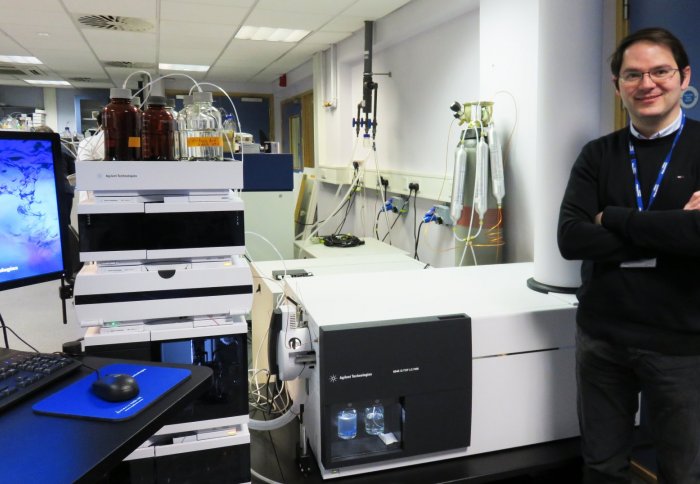Agilent join Imperial's fight against TB and antimicrobial resistance
by Naomi Black

Dr Gerald Larrouy-Maumus in his lab
Agilent Technologies (UK) have entered into partnership with Imperial College London through the loan of a state-of-the-art Time of Flight Machine.
The cutting edge analytical solutions will be used for studies of Mycobacterium tuberculosis (Mtb), the bacteria that causes tuberculosis. Tuberculosis is currently the world’s deadliest infectious disease with cases of multidrug-resistant TB having risen to 580,000 globally.
The combination of loaned instrumentation, software tools and industry expertise provides a unique opportunity to identify the key factors that allow microbes to resist the effects of drugs previously used to treat them; an ability referred to as antimicrobial resistance (AMR). Running costs for the project have been supported by the Faculty of Natural Science’s Kick-Start Fund and the Department of Life Sciences.
We are delighted to see our partnership with Imperial developing in this way – with powerful solutions in the hands of highly talented and determined researchers
– Dr Anthony Sullivan
LC/MS Product Specialist, Agilent
The 6545 Q-TOF Mass Spectrometer system will be used in the laboratory of Dr. Gerald Larrouy-Maumus, Life Sciences. His research, in the MRC Centre for Molecular Bacteriology and Infection (CMBI) focuses on Mycobacterium tuberculosis (Mtb) and metabolomics with the aim of identifying the factors and mechanisms that lead to antimicrobial resistance (AMR).
Metabolites, the intermediates and products of metabolism, provide important functional information on cellular biochemistry. Unlike genes and proteins, metabolites serve as direct read-outs of biochemical activities. Metabolites are therefore better able to directly correlate with phenotype and phenotypic AMR.
As small chemical molecules, metabolites are easily measureable using high-resolution, accurate mass LC/MS instrumentation. The Agilent 6545 Q-TOF Mass Spectrometer features a unique ‘fragile ion’ tune, allowing the most unstable of molecules to be structurally preserved, allowing the behaviour of bacteria to be tracked, revealing and identifying key metabolites, enzymes and pathways that will increase our knowledge and considerably help to design better antibiotics.
While Dr. Larrouy-Maumus’ research focuses specifically on the process of tuberculosis infection, he says the technology that the instrument utilises is important for the field as a whole. “Bacterial infections and antimicrobial resistance represent a worldwide threat that needs multidisciplinary research associated with the latest technologies” he says. “Using a powerful metabolomics approach gives us a unique opportunity to identify the key metabolic pathways and enzymes that could be the targets of future drugs. Not only is the Agilent 6545 Q-TOF the best suited equipment for this application, the accompanying software solutions developed by Agilent (VistaFlux, ProFinder and MPP) make it easy to deal with the massive amount of data.”
This project exemplifies what can be achieved when we form deep partnerships with our colleagues in the industrial sector. We are very grateful for Agilent’s generous support of this vital research.
– Tom Welton
Dean of Faculty of Natural Sciences
Professor David Holden, Director of the MRC CMBI commented “We are very grateful indeed to the Faculty of Natural Sciences and Agilent for enabling this metabolomics research, which has great potential - not only for Dr. Larrouy-Maumus’ research on mycobacteria but also for work on many other bacterial pathogens”.
Head of the Department of Life Sciences Murray Selkirk concurred, reflecting that “…the instrumentation will allow us to answer questions which would otherwise be impossible and progress the research field.”
“This project exemplifies what can be achieved when we form deep partnerships with our colleagues in the industrial sector,” said Tom Welton, Dean of the Faculty of Natural Sciences and controller of the Kick-start fund so important to this project’s success. “We are very grateful for Agilent’s generous support of this vital research.”
On behalf of Agilent, Dr Anthony Sullivan (LC/MS Product Specialist) said, “We are delighted to see our partnership with Imperial developing in this way – with powerful solutions in the hands of highly talented and determined researchers”.
Article text (excluding photos or graphics) © Imperial College London.
Photos and graphics subject to third party copyright used with permission or © Imperial College London.
Reporter
Naomi Black
Enterprise